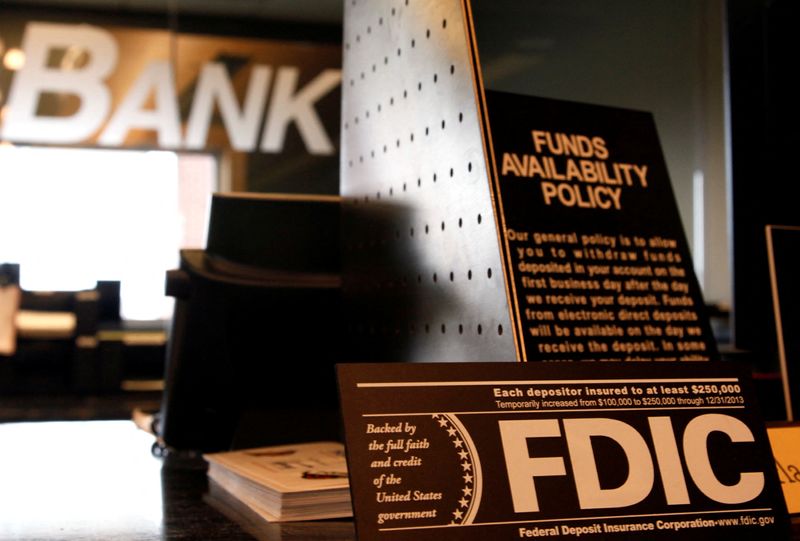Big U.S. lenders to pay billions to replenish bank failure fund
2023.05.11 11:47

© Reuters. FILE PHOTO: Signs explaining Federal Deposit Insurance Corporation (FDIC) and other banking policies are shown on the counter of a bank in Westminster, Colorado November 3, 2009. REUTERS/Rick Wilking/File Photo
By Pete Schroeder
(Reuters) -Around 113 of the largest U.S. lenders will bear the cost of replenishing the $16 billion hit to a key deposit insurance fund caused by recent bank failures, the Federal Deposit Insurance Corporation (FDIC) said on Thursday.
The bank regulator will apply a “special assessment” fee of 0.125% to the uninsured deposits of lenders in excess of $5 billion, based on the amount of uninsured deposits a bank held at the end of 2022, the FDIC proposed at a board meeting.
While the fee applies to all banks, in practice it would affect lenders with more than $50 billion in assets, which would cover over 95% of the cost, the agency said. Banks with less than $5 billion in assets would not pay any fee.
The levy would be collected over eight quarters beginning in June 2024, but could be adjusted as the estimated losses to the insurance fund change. The extended timeline aims to minimize the impact on bank liquidity and is expected to have a negligible impact on bank capital, according to FDIC officials.
The Banks Index was down 0.8% in morning trade, while the KBW Regional Banking Index slumped 2%.
The FDIC fund, which guarantees customers’ bank deposits of up to $250,000, stood at $128.2 billion at the end of 2022, according to the FDIC.
Banks usually pay a quarterly fee to finance the fund, but the FDIC said the special levy was necessary to cover hefty costs it incurred after Silicon Valley Bank and Signature Bank (OTC:) failed in March. Both banks, which had extremely high levels of uninsured deposits, abruptly failed after depositors fled amid concerns over their financial health. Regulators declared them critical to the financial system, allowing the FDIC to backstop all deposits in a bid to stop the contagion spreading.
The seizure of First Republic Bank (OTC:) and sale to JP Morgan Chase (NYSE:) this month is expected to cost that fund another $13 billion.
Under law, the FDIC has discretion in designing the fee, and FDIC Chairman Martin Gruenberg said on Thursday the proposal targets those who benefited most from the backstop.
“In general, large banks with large amounts of uninsured deposits benefited the most from the systemic risk determination,” he said in a statement.
The FDIC board approved the proposal Thursday along partisan lines, with its three Democratic members supporting it and its two Republican members voting no. The agency will now solicit feedback from the banking industry and the public, before ultimately finalizing the new fee.








